Summary of Findings
As the campaign heads into its final stages, the presidential race is again extremely close. The latest Pew Research Center survey of 1,307 registered voters, conducted Oct. 15-19, finds President George W. Bush and Sen. John Kerry tied at 45%-45% among registered voters, and 47%-47% among likely voters.(1) These findings represent a gain in support for the Democratic challenger since early October, when he trailed the president among both likely and registered voters.

Kerry’s gains in the horse race are tied more to an improving personal image than to growing strength on the issues. In particular, the Democratic challenger has virtually erased Bush’s advantage for honesty and having good judgment in a crisis. Kerry is again seen as the more empathetic candidate, an advantage he held earlier in the campaign but lost after the Republican convention. Bush continues to lead by significant but narrowing margins as the stronger leader and as the candidate more willing to take an unpopular stand on the issues.
There has been little movement in how voters assess the candidates on the issues. But a separate Pew Research Center poll of 803 adults shows that Bush’s own approval measures have weakened appreciably. Bush’s overall job approval stands at 44%, while solid majorities disapprove of his handling of the situation in Iraq (56% disapprove) and the economy (55%). Even on terrorism, the president’s strongest issue, his approval rating stands at 49% the lowest level since the Sept. 11 attacks.
Despite this erosion, however, most voters continue to believe that Bush, not Kerry, would do a better job of defending the country from future terrorist attacks (by 53%-35%). Bush also holds a 47%-41% advantage over Kerry as the candidate best able to handle Iraq. As in the past, more voters express confidence in Kerry than Bush to deal with the economy and improve the nation’s health care system.
The survey finds that voter opinion is solidifying even as the race tightens. A decreasing number of supporters of each candidate 8% of Kerry voters and 9% of Bush voters say they could still change their vote before Nov. 2. Moreover, 80% of all voters say the candidates take different positions from one another on the issues, far higher than the percentage who expressed that view in June, and at any point in the 2000 campaign.

Voters are broadly aware of most of the character and policy criticisms being traded by the candidates, such as the charge that Kerry “changes his mind too much” and that Bush “misled the public about the war in Iraq.” Among swing voters, in particular, the criticism that Kerry changes his mind too much is more damaging than the charges that he supports a return to big government or is “too liberal for the country.” By contrast, two major charges against Bush that he misled the public on Iraq and that he “cares more about the rich” are about equally troubling to swing voters.
Reflecting the closeness of the presidential race, identical numbers of voters now express favorable opinions of both Bush and Kerry (56% each). As in previous surveys, swing voters have positive impressions of both men 60% say that about Bush, 57% have a favorable opinion of Kerry.
Since the beginning of October, Kerry has achieved notable gains among two key groups of voters women and white Catholics. The gender gap is now about the same as it was in the 2000 exit poll, with women supporting Kerry by 10 points (51%-41%), while men back Bush by about the same margin (50%-39%). Women age 50 and older, who have been about evenly divided in recent Pew polls, now back Kerry by a substantial margin (53%-36%). And white Catholic voters, who have consistently favored Bush over the past month, now lean toward Kerry by 50%-43% (see table, pg. 12).
Despite Kerry’s improved showing in the horse race, he has yet to fully dispel concerns of voters who believe it would be risky to change leaders with the country facing war and the continuing threat of terrorism. The new survey finds that 41% of all voters including a third of swing voters believe it is a “major risk” to replace Bush with Kerry at this time. And when voters are asked about the risk of making a change while the U.S. is “threatened by terrorism,” slightly more voters (44%) say replacing Bush with Kerry represents a major risk.
The poll also finds that voters, by two-to-one (54%-27%), believe that Bush will win the election. More than eight-in-ten Bush voters (85%) believe the president will win, while Kerry supporters are much less confident (54% expect Kerry to win).

Bush Approval Ratings Sag
Overall views of Bush’s performance in office continue to sag. Evaluations of the president’s handling of Iraq, terrorism and foreign policy moved somewhat higher in the weeks following the Republican convention, but they have returned to levels as low, or lower, as in the late spring and summer.
Currently, 44% of Americans approve of the president’s job overall, while 48% disapprove. By large margins, majorities disapprove of how the president is handling Iraq (56% disapprove, 37% approve) and the economy (55%, 38%). Just under half of Americans (49%) approve of how the president is handling terrorist threats, down from 62% in early September.
Voters’ Priorities
For the most part, the issue priorities of voters have changed little since August. About three-quarters (78%) cite the economy as very important to their vote, and roughly the same number mention terrorism (77%), education (75%), Iraq (74%) and health care (73%). The issue of jobs was not included in the August survey, but that also ranks as a leading priority on the current survey (76% very important).
While the priorities of committed Bush voters differ markedly from those of certain Kerry voters, swing voters’ priorities are much closer to those of Kerry supporters than Bush voters. Nearly nine-in-ten Bush voters (88%) cite terrorism as very important to their vote, while other issues lag well behind in importance. Iraq and moral issues rank second among Bush voters (at 74% and 73% respectively), followed by the economy and education (67% each). Both terrorism and moral values rank much lower among the priorities of Kerry supporters and swing voters, which are dominated by bread-and butter issues such as jobs, health care and the economy.
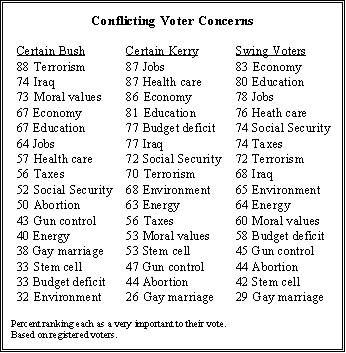
Jobs and health care lead the priorities of committed Kerry voters (87% rank each as “very important”). The economy ranks just behind at 86%, followed by education (81%), the budget deficit and Iraq (77% each). Swing voters also rate the economy, education, jobs and health care as most important. Terrorism, the leading issue for committed Bush voters, is a lower priority for Kerry supporters and swing voters, although about seven-in-ten in each group cite terrorism as a very important factor in their vote.
While most voters rate moral values as very important in their vote and this is especially the case for certain Bush voters they view specific social issues such as gay marriage and stem cell research as much less important. Of 16 issues tested, gay marriage is the lowest rated priority among Kerry supporters (26% very important) and swing voters (29%). While a somewhat higher percentage of committed Bush voters than others cite gay marriage as very important to their vote, significantly fewer do so now than in early August (51% then, 38% today).
Religious Gap on Social Issues
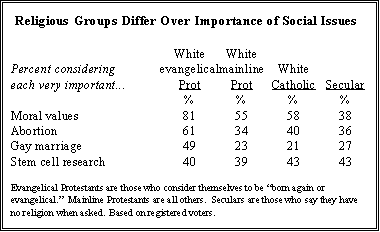
However, social issues do figure heavily in the voting decisions of white evangelical Protestants. About six-in-ten white evangelicals (61%) say abortion is very important to their vote, and roughly half (49%) say gay marriage will be a major factor in their vote. About half as many white mainline Protestants, white Catholics, and seculars rate the issue of gay marriage as equally important.
Abortion is a slightly bigger factor in the voting decisions of white Catholics than mainline Protestants (40% vs. 34%), but ranks below most other issues in importance. There are fewer differences among religious groups over the importance of stem cell research. Roughly four-in-ten members of all major religious groups, including seculars, say it will be very important in their voting decision.
Reasons for Supporting Bush, Kerry
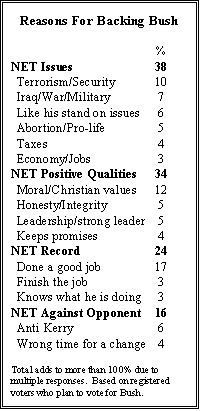
Supporters of Bush and Kerry offer very different reasons for why they want to see their candidate elected. For Bush voters, positive assessments of the president’s character are mentioned nearly as often as his stance on the issues, while for Kerry voters issues are predominant.
About four-in-ten Bush voters (38%) volunteer the president’s position on issues as the reason they most want to see him reelected. But nearly as many (34%) mention Bush’s personal qualities, such as his honesty and integrity, leadership qualities or his moral and Christian values. Roughly a quarter of Bush voters (24%) cite the president’s record in office and support for what he has done so far. Slightly fewer (16%) focused on negative aspects of Kerry or the need for continuity of leadership during a war.
Issues dominate the reasons Kerry voters give for why they want him to win on Nov. 2. Fully six-in-ten cite issues, including the war in Iraq and military issues, or the economy and jobs. A third of Kerry supporters mention negative factors about Bush as the main reason they want Kerry to prevail. Just 12% of Kerry voters mention the challenger’s personal qualities, far fewer than the 34% of Bush supporters who cite the president’s personal traits as the main reason they want him elected.
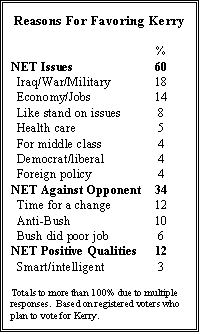
Campaign Themes Resonate
Majorities of voters say they are familiar with the leading criticisms lodged by each candidate against the other. Swing voters are generally less engaged in the presidential campaign, but nearly as many swing voters as committed voters say they have heard of criticisms made against Bush and Kerry.
About three-quarters (76%) of swing voters have heard the criticism that Kerry changes his mind too much, and 64% have heard the charge that Kerry is too liberal for the country. The president and his supporters also have charged that Kerry would bring big government solutions to issues such as health care, but voters generally and swing voters in particular are less aware of this criticism.

Of the criticisms lodged against Kerry, the “flip-flop” charge has the greatest impact. Nearly a third of swing voters (32%) and 37% of all voters say hearing this criticism makes them less likely to vote for Kerry. Even 17% of Democratic voters say that claim makes them less likely to support Kerry.
Among all voters, the criticism that Bush misled the public about the war (44%), and that he cares more about the rich than average Americans (41%), are most persuasive. Both of these criticisms have an impact on swing voters, with 38% saying that each makes them less likely to vote for Bush. Both also appear to be influential among voters in battleground states; 44% of voters in these states say the charge that Bush misled on Iraq makes them less likely to support him, while 45% say the same about the criticism that Bush cares more about the rich than average Americans.
Most Are Confident in Electoral System
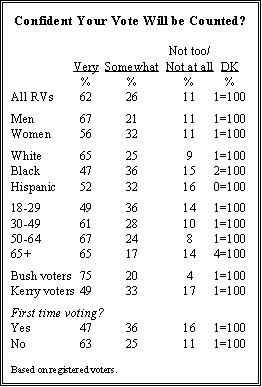
A majority of voters (62%) say they are “very” confident that their vote will be counted accurately in the upcoming election. Another 26% say they are “somewhat” confident, while small minorities say they are “not too” confident (7%) or “not at all” confident (4%) about their vote being counted.
However, there are wide disparities in voter confidence across political, racial, and other demographic lines. Just 47% of African American and 52% of Hispanic voters say they are very confident their vote will be counted, compared with 65% of white voters. More broadly, while three-quarters of Bush supporters are very confident their vote will be counted, only about half of Kerry supporters (49%) say the same.
New voters, and younger people in general, express more skepticism than older people about the electoral process. Just half of voters under age 30 (49%) say they are very confident their vote will be counted accurately, and this is about the same among all registered voters who say this year will be the first time they will have ever voted (47%).
Overall, women are less confident in the voting process than are men. Two-thirds of men are very confident that their vote will be counted (67%), but only 56% of women feel this way.
Over seven-in-ten registered voters (72%) say they have heard about the use of new technology by many states to change the way votes are cast and counted in this year’s election, though the public’s reaction to these electoral reforms is lukewarm. Among those familiar with the changes, 24% say technology will make things better; 27% say they will not make much difference, and 12% say the changes will make things worse.

Ground Game Gearing Up
While get-out-the-vote efforts will move into high gear over the next two weeks, 26% of registered voters say they already have been contacted over the phone by candidates, campaigns or other groups urging them to vote in a particular way on Nov. 2. Overall, 7% of voters say they have been contacted only by Republican groups, while another 7% have been contacted by both Republican and Democratic groups. About as many voters report being contacted by Democratic groups (6% Democrat only, 7% both).
The concentration of campaigns’ telephone efforts in the battleground states, and among voters who have yet to make up their minds is apparent. Fully 36% of voters in battleground states say they have been contacted about the election, compared with 21% of voters in states where Kerry is favored, and 19% in states where Bush is expected to win. In the battleground states, 12% of registered voters in the battleground states say they have already been contacted by phone from both sides during this campaign, and both Democrats and Republicans appear to be reaching about the same number of voters.
Telephone contacts have been far less common among younger voters than among those over age 50. Only about one-in-five voters under age 30 (18%) report having been called by a campaign, party or group, compared with 29% of those age 50-64 and 40% of those age 65 and older. Among voters age 65 and older, about twice as many (14%) report they have been contacted only by Republican groups as say they have been contacted only by Democratic groups (6%); 12% of those 65 and older say they have been contacted by both Republican and Democratic groups.
Ballot Proposals Attract Interest
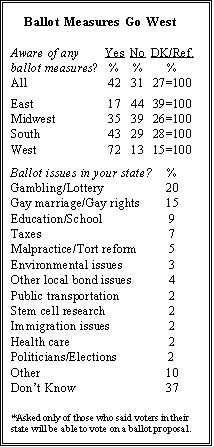
Overall, more than four-in-ten voters (42%) say initiatives, referendums, or state constitutional amendments are on the ballot in their states this fall. In the 34 states where there are statewide proposals on the ballot, 56% of voters say they are aware of such measures.
Nearly three-quarters (72%) of voters in Western states are aware of initiatives on their ballot, which reflects the fact that there are statewide measures in every state in that region. By comparison, far fewer voters in the South (43%), Midwest (35%) and East (17%) are aware of ballot initiatives in their states.
Gambling measures are the most visible type of ballot measures, followed by proposed constitutional amendments to ban gay marriage. One-in-five respondents (20%) who say there are ballot measures up in their states mention some type of gambling issue. Gay marriage is a close second to gambling in its visibility. Eleven states have proposals to amend state constitutions to ban gay marriage. Overall, 15% of voters aware of ballot measures mentioned gay marriage, and this figure is 45% in states with gay marriage proposals on the ballot.
Among voters aware of initiatives and referendums in their state, 41% say they are very interested in such ballot issues this year; 45% are fairly interested. Comparable numbers of people across the ideological spectrum liberals, moderates, conservatives express interest in ballot measures.
War Support Wanes

Americans are now closely divided over the decision to go to war in Iraq 46% believe it was the right decision while 42% say it was wrong. In September, a 53% majority said it was the right decision, compared with 39% who said it was the wrong decision.
Support for the war has slipped among nearly all demographic and political groups, but the shift has been especially dramatic among young people. Just 43% of those under age 30 have a positive view of the decision to go to war, down from 59% in early September.
Other judgments about the war in Iraq have been relatively stable since September. About half (51%) consider the war in Iraq to be going at least fairly well, while 43% say it is not going well. These assessments are virtually unchanged from last month. A majority (at 57%) continue to believe that the U.S. should keep the troops in Iraq until the situation has stabilized, while 36% say the troops should be brought home as soon as possible.

A plurality of Americans (45%) say the war in Iraq has helped the war on terrorism, while 40% believe it has hurt that effort. There is no agreement concerning the war’s impact on the risk of terrorism in this country. About a third (36%) say the war in Iraq has increased the chances of terrorism in the U.S.; 32% say it has lessened that risk; and 28% say the war has made no difference.
Surging Election News Interest
While the intensely fought presidential election is drawing wide attention, the high price of gasoline these days currently tops the American public’s list of news interests. Nearly two-thirds (64%) say they are following news about gas prices very closely, and another 22% are following somewhat closely. Public attention to this story has not been as high since May 2001. Interest in this issue is high across all parts of the country.
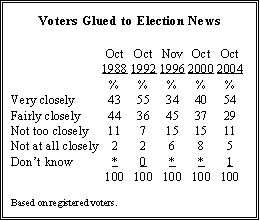
Nearly half of Americans (46%) are following news about candidates for the 2004 presidential election very closely. Looking specifically at registered voters, fully 54% are following news about the campaign very closely, far higher than the 40% who closely followed campaign news four years ago or the 34% who were very interested in campaign news on the eve of the 1996 election. Only in 1992 was voter interest in the campaign as high as it is currently.
The shortage in the supply of flu vaccines available this year is being followed very closely by 44% of Americans. Interest is highest among women (52% vs. 35% of men), as well as older and lower income Americans.
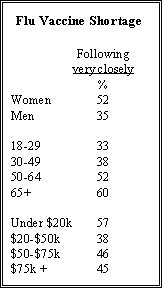
Despite continuing violence in Iraq, public attention to news from that country has fallen over the past month, from 47% following very closely in September to 42% today. There is also a considerable drop in the proportion of Americans closely following economic news. Just three-in-ten report paying very close attention to reports about the condition of the U.S. economy, down from 39% a month ago.
One-in-five say they are following news about a possible eruption of Mount St. Helens, the largest active volcano in the U.S. that last blew its top in 1980. Not surprisingly, attention is higher in the West (28% very closely) than elsewhere.